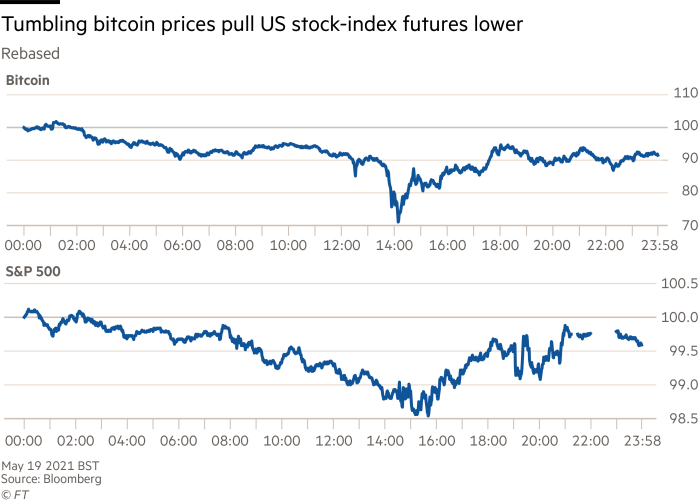A huge drop and snap back in cryptocurrency prices this week rippled into traditional asset classes, potentially offering a taste of what could happen in the event of a more severe shake-up.
Some government bonds gained in price on Wednesday, while futures on the US benchmark S&P 500 equities index dipped and oil also pulled back after the price of bitcoin plunged 30 per cent on signs that China was preparing a crackdown on digital tokens. The Japanese yen — a currency often in demand in times of stress — also popped higher.
Hours later, bitcoin rebounded sharply. But it was unusual for the ructions to catch the attention of mainstream market participants.
“The catalyst for these moves appears to have been a sudden rout in bitcoin,” wrote Richard McGuire and Lyn Graham-Taylor, rates analysts at Rabobank, in their regular note the following day. “So here we are. Even as august an organ as the Rabo Rates Daily has finally been forced to put cryptocurrencies front and centre.”

The pair wrote that it “seems hard to conceive of how there can be a direct link between bitcoin’s gyrations and movements on the part of the global financial market”.
Typically, crypto prices are driven by obscure factors such as tweets from bitcoin enthusiast Elon Musk, whose electric vehicle company Tesla had bought large quantities of the tokens. Shifts in price in highly speculative cryptocurrencies rarely if ever impinge on regulated and established markets.
But that may be starting to change.
On Friday afternoon, cryptocurrencies fell sharply again after China’s vice-premier Liu He restated Beijing’s determination to curb cryptocurrency mining and trading.
The news knocked 12 per cent off the value of bitcoin, 20 per cent from ethereum and 18 per cent from dogecoin. The sell-off appeared to bleed into the US stock market, where the tech-heavy Nasdaq dipped in the last hour of trading.
At Barclays, credit analyst Soren Willemann also noted that the turmoil in bitcoin had rumbled European corporate bonds. “Direct implications are hard to dream up, but to the extent that the crypto correction correlates with weakness in shares of modern tech companies (not least Tesla’s bitcoin holdings), it matters to European credit, as it is hard for our markets to ignore [S&P 500] weakness,” he said. “That said, we would be buyers on any crypto-induced dip.”
With regulators around the world increasingly circling the cryptocurrencies market, mostly in an effort to bolster consumer protections, the question of bitcoin’s relevance to wider markets has become more pressing among investors.
One theory is that if bitcoin prices were to nosedive, that could be a meaningful blow to household finances for retail investors, chipping away at the narrative that the buoyant consumer can continue to prop up stock markets.
In addition, some funds and family offices have put money into cryptocurrencies, triggering a surge of interest among investment banks seeking to facilitate demand. On the margins, a large crypto drop could also dent the market’s appetite for risky bets.
The counterpoint is that a boom in crypto trading has coincided with a drop in volumes on stock trading platforms favoured by have-a-go day traders. Any large and sustained crypto fall could therefore prove to be a trigger for a pick-up in riskier parts of the stock market if those retail investors were to return to stocks.
"traditional" - Google News
May 22, 2021 at 03:59PM
https://ift.tt/3wqlERM
Bitcoin turmoil seeps into traditional financial markets - Financial Times
"traditional" - Google News
https://ift.tt/36u1SIt
Shoes Man Tutorial
Pos News Update
Meme Update
Korean Entertainment News
Japan News Update
Bagikan Berita Ini














0 Response to "Bitcoin turmoil seeps into traditional financial markets - Financial Times"
Post a Comment